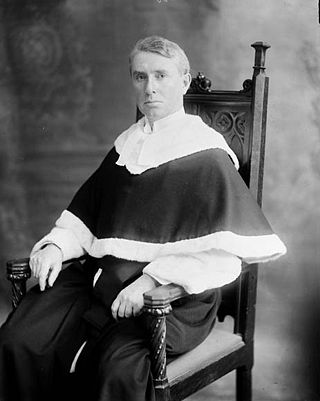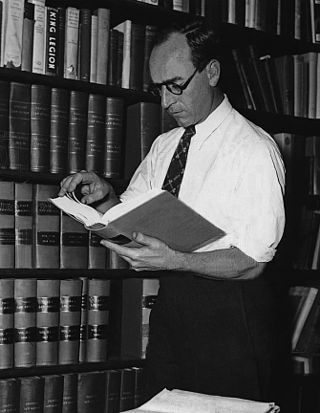Related Research Articles
Precedent is a principle or rule established in a legal case that becomes authoritative to a court or other tribunal when deciding subsequent cases with similar legal issues or facts. The legal doctrine stating that courts should follow precedent is called stare decisis.
Case law, also used interchangeably with common law, is a law that is based on precedents, that is the judicial decisions from previous cases, rather than law based on constitutions, statutes, or regulations. Case law uses the detailed facts of a legal case that have been resolved by courts or similar tribunals. These past decisions are called "case law", or precedent. Stare decisis—a Latin phrase meaning "let the decision stand"—is the principle by which judges are bound to such past decisions, drawing on established judicial authority to formulate their positions.

Puck was the first successful humor magazine in the United States of colorful cartoons, caricatures and political satire of the issues of the day. It was founded in 1876 as a German-language publication by Joseph Keppler, an Austrian immigrant cartoonist. Puck's first English-language edition was published in 1877, covering issues like New York City's Tammany Hall, presidential politics, and social issues of the late 19th century to the early 20th century.
Legal realism is a naturalistic approach to law; it is the view that jurisprudence should emulate the methods of natural science, that is, it should rely on empirical evidence. Hypotheses must be tested against observations of the world.

Herman Jacob Mankiewicz was an American screenwriter who, with Orson Welles, wrote the screenplay for Citizen Kane (1941). Both Mankiewicz and Welles would go on to receive the Academy Award for Best Original Screenplay for the film. He was previously a Berlin correspondent for Women’s Wear Daily, assistant theater editor at The New York Times, and the first regular drama critic at The New Yorker. Alexander Woollcott said that Mankiewicz was the "funniest man in New York".

The University of Chicago Law School is the law school of the University of Chicago, a private research university in Chicago, Illinois. It is consistently ranked among the best and most prestigious law schools in the world, and has many distinguished alumni in the judiciary, academia, government, politics and business. It employs more than 180 full-time and part-time faculty and hosts more than 600 students in its Juris Doctor program, while also offering the Master of Laws, Master of Studies in Law and Doctor of Juridical Science degrees in law.

Egan v Canada, [1995] 2 SCR 513 was one of a trilogy of equality rights cases published by a very divided Supreme Court of Canada in the spring of 1995. It stands today as a landmark Supreme Court case which established that sexual orientation constitutes a prohibited basis of discrimination under section 15 of the Canadian Charter of Rights and Freedoms.

Sir Lyman Poore Duff,, PC(UK) was a Canadian lawyer and judge who served as the eighth Chief Justice of Canada. He was the longest-serving justice of the Supreme Court of Canada.

Everett Norris Case, nicknamed the "Old Gray Fox", was a basketball coach most notable for his tenure at North Carolina State University, from 1946 to 1964.

Thomas Joseph Moyer was an American jurist and the chief justice of the Ohio Supreme Court from 1987 to 2010. A member of the Republican Party, he formerly served as a justice of the 10th district of the Ohio District Courts of Appeals from 1979 to 1987. The Thomas J. Moyer Ohio Judicial Center, headquarters of the Ohio Supreme Court, was named in his honor in 2011.
Judicial restraint is a judicial interpretation that recommends favoring the status quo in judicial activities and is the opposite of judicial activism. Aspects of judicial restraint include the principle of stare decisis ; a conservative approach to standing and a reluctance to grant certiorari; and a tendency to deliver narrowly tailored verdicts, avoiding "unnecessary resolution of broad questions."

Karl Nickerson Llewellyn was an American jurisprudential scholar associated with the school of legal realism. The Journal of Legal Studies has identified Llewellyn as one of the twenty most cited American legal scholars of the 20th century.

Joseph Urban was an Austrian-American architect, illustrator, and scenic designer.
Robert Sherlock Smith is a former Associate Judge of the New York Court of Appeals. Smith retired on December 31, 2014, as the State Constitution's requirement that judges retire at the end of the calendar year in which they reached the age of 70.

The Battle Over Citizen Kane is a 1996 American documentary film directed and produced by Thomas Lennon and Michael Epstein, from a screenplay by Lennon and Richard Ben Cramer, who also narrates. It chronicles the clash between Orson Welles and William Randolph Hearst over the production and release of Welles's 1941 film Citizen Kane, which has been considered the greatest film ever made.
Cosmopolitan Productions, also often referred to as Cosmopolitan Pictures, was an American film company based in New York City from 1918 to 1923 and Hollywood until 1938.
Herman Lee Donovan was an American educator and college administrator who served as the fourth president of the University of Kentucky (UK) from 1941 to 1956. During this period, the University of Kentucky faced many challenges including the desegregation of both the graduate and undergraduate divisions, an influx of veterans as a result of the G.I. Bill, and political interference from legislators in Frankfort.
William Underhill Moore (1879–1949) was an American legal scholar and Sterling Professor of Law at the Yale Law School (1929–49), having previously taught at Columbia. His principal teaching fields were commercial bank credit and business organizations, Moore was considered one of the intellectual leaders of the Legal Realism movement at Yale and an early user of social scientific methods in legal research.
Theodore S. Hope Jr. (1903–1998) was a corporate lawyer in New York City for over 50 years.
Kimble v. Marvel Entertainment, LLC, 576 U.S. 446 (2015), is a significant decision of the United States Supreme Court for several reasons. One is that the Court turned back a considerable amount of academic criticism of both the patent misuse doctrine as developed by the Supreme Court and the particular legal principle at issue in the case. Another is that the Court firmly rejected efforts to assimilate the patent misuse doctrine to antitrust law and explained in some detail the different policies at work in the two bodies of law. Finally, the majority and dissenting opinions informatively articulate two opposing views of the proper role of the doctrine of stare decisis in US law.
References
- 1 2 3 Bailey, Mark Warren (2000). Herman Oliphant | American National Biography. doi:10.1093/anb/9780198606697.article.1100641. ISBN 978-0-19-860669-7.
{{cite book}}:|website=ignored (help) - ↑ Herman Oliphant, A Return to Stare Decisis, 14 A.B.A. J. 71, 161 (1928).
- Columbia Law:Expanding Curriculum: Part 2
- CiteSeer: A Computational Model of Ratio Decidendi
- William Randolph Hearst and Lammont Dupont Archived March 3, 2008, at the Wayback Machine
- "Another Exit". Time . December 17, 1951. Archived from the original on November 23, 2010. Retrieved August 10, 2008.
- "Exit and Entrance". Time. January 23, 1939. Archived from the original on December 14, 2008. Retrieved August 10, 2008.